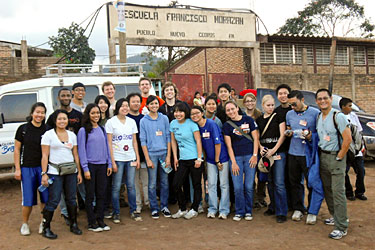Learn More About PUC
Medical Brigade to Honduras
By Janna Vassantachart on January 25, 2010
Share this

During the Christmas season this year, Pacific Union College held its first Global Medical Brigade (GMB) trip. The site was in Honduras, the second-poorest country in Central America, and 22 students and one physician devoted a week of their vacation with the mission of providing medical care.
GMB is an organization developing sustainable health initiatives and providing relief in areas of limited healthcare access, with a focus in Central America. It is a program of Global Brigades, Inc., the world’s largest student-led global health and sustainable development organization. They define "brigades" as “groups of passionate volunteers who mobilize toward positive social change.”
Last year, several PUC students went on a GMB trip with UCLA, and this year the movement spread to our own campus. In December, the PUC students were joined by a few La Sierra University and Loma Linda University students, PUC staff member Edilson Garcia, and student Janna Vassantachart's father, Prasit Ben Vassantachart, who works in internal medicine. The PUC brigade traveled to Tegucigalpa and settled into brick cabins alongside Sociedad Amigos de los Niños- Nuevo Paraiso Village, the orphanage project of a nun named Sister Maria Rosa.
The first day was spent visiting the orphans and viewing what one passionate, faithful woman envisioned to help God’s children. Each of the following three days brought the mobile brigade clinic to a different community. Mornings began before the rooster call to account for traveling time — up to three to four hours a day bouncing through hilly terrain to bring medical service to people whose nearest clinic was a day’s travel away.
On site, triage, physician consult, and pharmacy stations were set up. Global Brigades provided two additional physicians, and University of Southern California's dental group also joined the brigade for a day.
A definite challenge was the language barrier. Edilson “Chino” Garcia and juniors Jessica Kremer, Katherine McMillan, and Kaileen Yeong, the four bilingual volunteers, were in high demand between triage and the physicians. Other students kept Spanish dictionaries on hand and jotted key phrases on 3 x 5 cards. Without any Spanish background, freshman Jeremy Lam could obtain symptoms from patients in triage after a five-minute crash course.
Once seen by a physician, patients waited for medicines to be packaged and labeled by students in the pharmacy. The medicines were donated by various organizations and brought to Honduras by the volunteers. Sophomore Carissa Kan said, “Working in the pharmacy was a good learning experience… After the trip, I was even more convinced that pharmacy was the right choice for me.” Other new skills included learning to wrap blood pressure cuffs from LLU nursing student Elisha Ilio.
The days flew by, and the patient count was tallied. Day one provided medical service to 250 people, day two to 365, and day three to 250.
The Honduras medical mission trip was a meaningful experience for each volunteer. Students bonded over a singular purpose and worked together towards a mission. New goals were set: learn Spanish. Appreciation was renewed for the simple things: fluoride. And, a purpose as humans was revitalized: service.
Latest News
Young Observatory Reopens and Obtains New Technology
By Ally Romanes on January 8, 2026
Maxwell Scholar Feature: Liah Ronneburg
By Marina Maher on December 30, 2025
First Set of PUC’s North Coast Nursing Students Graduate
By Ally Romanes on December 23, 2025
Two Tonge Grants Awarded to M.A. in Communication and Aviation Program
By Marina Maher on December 22, 2025
